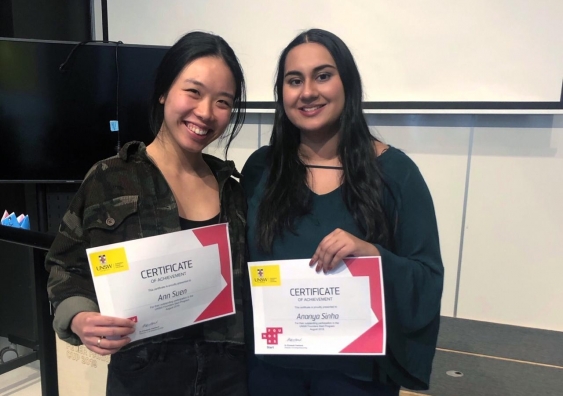When Ananya Sinha thought of a hypothetical start-up for a university assessment, she didn't know it would turn into the sustainable tech business.

Co-founders of Indus Global Ann Suen and Ananya Sinha after they won the UNSW Founders Start pitch.
The UNSW Business School student needed a start-up idea while undertaking entrepreneurship and innovation studies at UCLA for a Study Abroad Program.
Ananya was inspired by her aunties, who would travel to Dubai from India just to purchase iPhones and avoid excessive taxes. In India, she had also seen small village business-owners run entire operations from their smartphones.
Ananya then developed a social enterprise focusing on combatting the huge issue of e-waste in Australia by taking advantage of the circular economy. She named the enterprise Indus Global after one of the longest rivers in Asia.
"It's really funny because it was a completely hypothetical … just an idea that wasn't supposed to be launched," she said.
The idea came to fruition when she realised Australians had smartphones that aren't being used in our bedside drawers that would have so much value to others.
Ananya and her co-founder Ann Suen, are now in the process of building a platform that allows Australians to easily recycle their used smartphones responsibly for a monetary incentive, which is planned to launch in early 2020.
The start-up works via their digital website, where customers fill out a simple form, and the web application generates an automated quote. The customer will get sent a free prepaid package in the mail.
Once Indus Global receives the phone, they send customers the money within 24 hours and find the device a new home in a developing country.
"We're trying to redefine how people actually consume and repurpose the goods that they have lying around," she said.
She said the average Australian changed their phone every two years, but we don't recycle our e-waste properly, with only 20% being recycled.
"All these toxins end up in landfill. It's not just bad for the environment, it's actually really bad for our health as well," she said.
Indus Global has also been part of two accelerator programs for the UNSW Founders Program, won the UNSW Founders Start pitch and were able to pitch to the Indian High Commission and receive some funding.
"We've been able to meet real-life entrepreneurs and talk about their real mistakes and their wins".
The biggest piece of advice she would give to others trying to create their own start-up is that you need to be passionate about what you're doing.
However, Ananya said one of the biggest challenges she's faced is imposter syndrome.
"It's really easy to get overwhelmed when you first become a part of the start-up ecosystem and start hearing buzzwords such as Blockchain or AI. I didn't even know what building an MVP (Minimum Viable Product) was until the beginning of the year," she said.
"You just have to remember that what defines the start-up sphere is the fact that no one really knows exactly what they are doing and everyone is trying something new. You need to trust yourself and go with the flow because that is all you really can do," she said.






